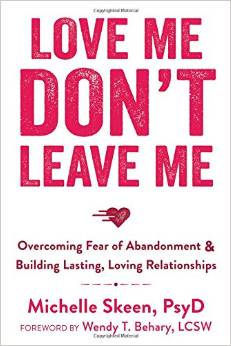In her new book, LOVE ME, DON’T LEAVE ME, psychologist and relationship expert Michelle Skeen, PsyD, reveals the five big fears that can cause relationships to short circuit. Skeen helps people move past these fears so that they can forge lasting relationships.
Skeen explains that fears often cause people to jump to conclusions and act in ways that will push their loved ones away, rather than drawing them closer. “The good news is that you can put a stop to how you react to situations and you can build better relationships,” says Skeen. As she explains, whether you’re clingy or afraid to open up, whether you gravitate toward the wrong men or feel the need to be someone you’re not, your behavior is getting in the way of the connections you crave.
IS YOUR FEAR OF ABANDONMENT HURTING YOUR RELATIONSHIPS?New Book By Psychologist Michelle Skeen, PsyD, Offers A Step-By-Step
Guide to Understanding Your Fears and Changing The Behaviors
That Are Sabotaging Your Love Life
Everyone longs for closeness and long-term relationships, but too many people find themselves alone – pushing partners away, leaving before they can be left, or consistently choosing the wrong mates. In her new book, LOVE ME, DON’T LEAVE ME: Overcoming Fear of Abandonment & Building Lasting, Loving Relationships (New Harbinger/September 2014), psychologist Michelle Skeen, PsyD, reveals how fear of abandonment sabotages relationships. She offers a powerful guide to working through long-standing fears and changing behaviors that impede healthy connections with others.
Skeen begins by explaining how childhood experiences set the stage for the “core beliefs” that underlie people’s self-perceptions and how they interact with others. “Any one of an array of scenarios – your parents’ divorce, the loss of someone important to you (or that person being with you inconsistently or unpredictably), being overprotected, having an alcoholic or drug-addicted parent – can leave you feeling disconnected, alone – abandoned,” says Skeen. In turn, these core beliefs shape the way individuals respond to those around them, she writes.
“When your core beliefs get triggered by a situation or interaction that reminds you of a painful experience from your childhood, you often react in ways that perpetuate these experiences,” she continues. For example, if someone you are dating doesn’t respond to a phone call immediately, and you react by becoming clingy due to your fear of abandonment, you may well push that person away – confirming your prediction that he or she will leave you.
LOVE ME, DON’T LEAVE ME describes how understanding your story, and how it is affecting the present, enables you to change your relationships moving forward. Skeen’s step-by-step process begins with uncovering your underlying core beliefs by using the self-assessments in the book (and on www.lovemedontleaveme.com), and journaling as the author suggests. These harmful beliefs include abandonment, mistrust and abuse, emotional deprivation (the belief that you won’t receive the support that you need), defectiveness (the feeling that you are unworthy and unlovable), and failure (the sense that you don’t measure up). Skeen also points out the kinds of destructive reactions these beliefs often engender, and the types of people that are likely to trigger these responses – such as those who are unpredictable, unavailable, detached, judgmental, or ego-driven.
With multiple examples, Skeen walks readers through developing the skills they need to distance themselves from their core beliefs. These include:
Mindfulness – Cultivating awareness of your behaviors gets you out of your limited mindset and allows you to make behavioral choices rather than defaulting to habitual responses. Skeen recommends such mindfulness exercises as taking a walk, consciously noticing your own sensations as well as what is around you, and then recording your experience in a journal.
Letting Go Of What You Can’t Change – The pain engendered by past experiences won’t go away, says Skeen. The key is to accept the pain that emerges when your core beliefs get triggered, and then change your behavior in reaction to this pain. “You need to begin to see your experience as transitory,” the author writes.
Identifying and Committing to Your Values – “By getting in touch with your core values and committing to living a values-driven life, you can stop resorting to your old core belief-driven behaviors,” explains Skeen. For example, valuing intimacy and openness is in direct conflict with withholding the “real you” from your partner due to fear of rejection.
Managing Your Emotions – Emotional pain is what drives people to engage in unhelpful coping behaviors, declares Skeen. “You can’t eliminate negative feelings, but by accepting them rather than trying to control them, you can use them to help you learn and grow,” she writes. LOVE ME, DON’T LEAVE ME details a variety of ways to deal with painful emotions when they surface, from exercising to volunteering, and from taking care of items on your “to do” list to getting a manicure or facial.
“My ultimate goal in writing this book is to get you to a place where you can be present in a relationship without being controlled by your fears,” says Skeen. By using the information and skills she shares in LOVE ME, DON’T LEAVE ME, readers can get closer to the healthy relationships that they desire.


Comments are closed.